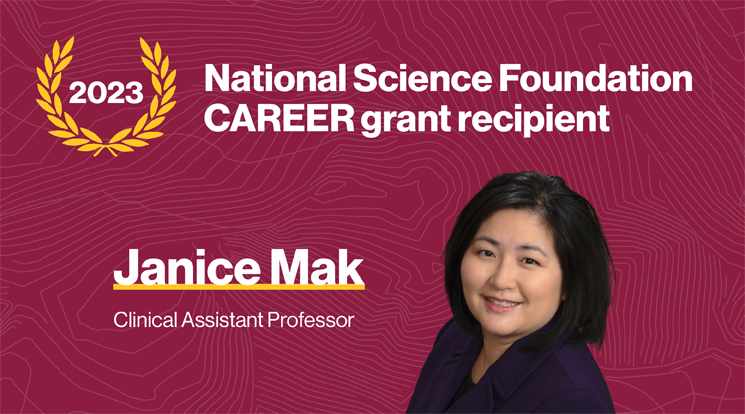Janice Mak researches how education policy can broaden participation in computer science education

A growing number of states want to strengthen career and academic pathways in the computer sciences, and they are creating new statewide roles, policies and course requirements at the K–12 level.
Janice Mak, a clinical assistant professor at ASU’s Mary Lou Fulton Teachers College has been pursuing research on this intersection of computer science education, policy and systems change. Her area of focus explores how K-12 education policy affects representation of students of diverse backgrounds within the computer science professions.
Her latest work focuses on the role of computer science state supervisors, a role that more than 30 states have created over the past decade to better align computer science preparation efforts at the K–12 level. In support of Mak’s research, the National Science Foundation (NSF) awarded her a prestigious grant from the Faculty Early Career Development Program, also known as the CAREER Award.
Mak joins a select group of ASU faculty being recognized with a CAREER award. Many of the recipients are directly involved in engineering research and pursuing scientific discoveries. Mak’s recognition stands out for its emphasis on educational policy at the K–12 level by supporting the development of a diverse workforce capable of directly contributing to discoveries in science, technology, engineering and math (STEM).
Mak’s research includes two NSF grants
Mak’s five-year $619,035 CAREER award goes toward her research project Computer Science Education State Supervisors: Toward Support for All.
“There is a need to better understand structural barriers to diversity in computing by looking at the entire ecosystem from pre-K through the workforce,” Mak says. “The role of the computer science state supervisor can be instrumental in ensuring that equitable access to K–12 computer science learning pathways are enacted through teacher training, resource development, teacher certification pathways, community outreach and administrator support.”
About 53% of U.S. high schools now offer foundational computer science, however disparities persist among schools attended primarily by minoritized students, according to statistics compiled in the 2022 State of Computer Science Education report. Expanding access can help address these gaps. For example, the report notes that in states that emphasize computer science (as either a graduation requirement, or as part of an existing requirement) young women have a 40 % participation rate, compared to the national average participation rate of just 32%.
Mak’s research will further deepen how the role of computer science state supervisor can help reduce these disparities. The project includes: a landscape study into the roles of K–12 computer science state supervisors and how they are operationalized across states; a comparative case study of these positions in four states to explore more comprehensively how these positions function; and the creation of a toolkit along with a set of resources to support the computer science state supervisor community of practice with a view to equity.
Mak’s other research includes being part of an NSF Discovery Research PreK–12 team (led by principal investigators Brian Nelson, MLFTC professor and Diane Jass Ketelhut, professor at the University of Maryland) that is exploring computational thinking integration within elementary science classrooms using culturally responsive teaching.
Mak is also leading two grants on data science funded by the Burton Family Foundation. Through one of the grants, she co-launched the Arizona Data Science Summit in partnership with the Arizona Department of Education to initiate statewide dialogue around K–12 pipeline data literacy. The other grant is supporting her research into how preservice teachers conceptualize data science across contents and methods courses. Mak is also co-designing a culturally responsive-sustaining high school level computer science course that integrates ancestral knowledge systems in computing as part of a larger grant awarded to the University of Arizona.
Practice and research
Mak brings experience as a researcher, teacher, assistant principal and curriculum specialist. Her board service includes the Arizona State Board of Education, Computer Science Teachers Association, National Center for Women and Information Technology (NCWIT) K–12 Alliance leadership team and the National Science Teaching Association Technology Advisory Board.
“My research interests started with my years as a practitioner teaching computer science at the K–12 level where just three of those students were female,” she says. “As I got more involved in policy through the state board of education, I saw the role that systems have to play in developing more equitable pathways and that has informed my line of research moving forward.”
Mak, whose recognitions include the Presidential Award for Excellence in Mathematics and Science Teaching (PAEMST), ISTE’s Making IT Happen Award, CADRE DRK12 Fellow and CIRCLS AI Fellow, continues to be involved in policy discussions. She was recently appointed as co-chair of Arizona Department of Education's technology task force and worked with stakeholders to create solutions to address the digital equity and opportunity gap.
“I am inspired by ASU’s design aspiration of use-inspired research and charter statement about advancing research and discovery of public value; the opportunity provided to me through this grant has the potential to inform policies and practices and procedures at the state and district levels in ways that can break down silos and help strengthen and expand access to computer science pathways,” she says.